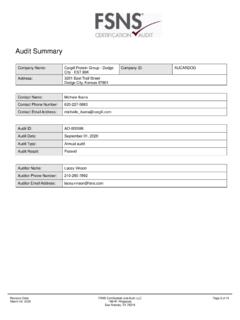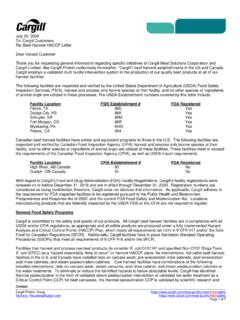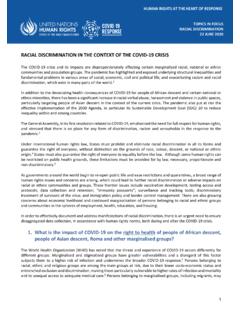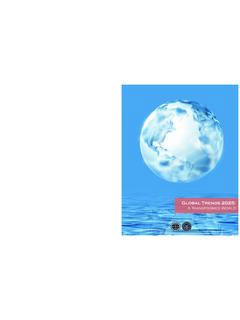Transcription of Nourishing the world - Cargill
1 Nourishing the worldNourishing the world2020 Annual Report Cargill | 2020 Annual Report 2 Letter to stakeholdersLetter to stakeholdersThis was a year that tested all assumptions: about how markets and supply chains function in an age of global interdependency; about what it means to truly deliver for customers, consumers and communities; and about how companies can and should operate in a such a challenging environment, we have anchored ourselves to our purpose and our values. Fundamentally, Cargill exists to nourish the world in a safe, responsible and sustainable way. We connect those who grow food to those who consume it. As we do so, we make decisions based on our core values of putting people first, doing the right thing and reaching higher. This year gave us ample opportunities to live all been in business for 155 years, we are no stranger to crises. We have navigated natural disasters, depres-sions and conflicts. Now, we look toward the future with David MacLennan Chairman and Chief Executive Officer David Dines Chief Financial Officera resilient portfolio of businesses, strong relationships around the world with farmers and leading food brands, a healthy balance sheet, and steady revenues that totaled $ billion for the importantly, we have a dedicated team of 155,000 employees propelling us forward.
2 They have persevered even as their work routines and personal lives have been heavily disrupted by the COVID-19 pandemic. To help them as they face unexpected hardships, Cargill launched a $15 million employee disaster relief fund. Meanwhile, because of our employees tremendous efforts, farmers and ranchers facing difficult economic circumstances have had a mar-ket to sell their products. Grocers have quickly restocked shelves. And families have kept a variety of nutritious, afford-able foods on their tables. As just one example among many, our animal nutrition busi-ness in China embraced a new approach to supporting farmer customers amid the COVID-19 pandemic and the continued presence of African swine fever. A single webinar the team hosted in May was viewed by 296,000 hog farmers looking for solutions related to biosecurity and alternatives to traditional antibiotic growth promoters. Going forward, ingenuity like this will help Cargill find new ways to fulfill our disruptions to food, agriculture and trade in the past year made it clear that solving our shared challenges will require working in broad global coalitions.
3 We continue to strongly support the Global Compact, and its initiatives and principles for human rights, labor, the environment and anti-corruption. More information about our actions in these areas is included in the following pages. Certainly, there is much more work to do. Collectively, we must build a sustainable food system that both nourishes the world and protects the planet. We must support agricultural communities around the globe so that farming is a viable option for the next generation. And we must ensure that all people are treated with dignity and respect, and given equal opportunities to grow and thrive. For Cargill , this includes con-fronting systemic racism, using our voice to push for policy changes that will end racial disparities and protect everyone in our communities, and taking action to mitigate bias within our own company and ensure we reflect the communities we despite all these challenges, what the past year has taught us is that we are capable of much more than we previ-ously thought.
4 We are grateful to our employees, customers and other partners who have shown us this. Alongside all of them, we will make Cargill a company that leads in the areas that matter 4, 2020In a year like no other, we are deeply focused on our essential work of Nourishing the world in a safe, responsible and sustainable way. Cargill | 2020 Annual Report 3 Safety is Cargill s deepest commitment: to our employees, to those who consume our products, and to the communi-ties where we live and work. Our constant attention to safety has enabled us to steadily remove risks from our business, reducing our injury rate by 88% during the past 30 years. As the COVID-19 crisis emerged, we adapted our pandemic response plan and leaned on our integrated operating approach to quickly deploy robust preparations worldwide. Our team in China helped us learn and adjust at the start of the outbreak. We set up a corporate crisis action team as well as one for each region, suspended travel and closed offices early to stay ahead of the curve, and put extensive measures in place to protect plant employees, who are essential to our ability to produce food for people every-where.
5 We encouraged employees to report any concerns through our global, independently managed Ethics Open Line. Despite our efforts, in some instances the virus still impacted our employees and operations. Throughout the crisis , we have held fast to one primary principle: We only operate a facility if we can do so continue to focus on safety in all its forms: physical, psychological and social. This year, we held companywide events for physical safety and inclusion in October and February, respectively. In October, teams in every business and region paused work and used our See. Say. Stop. pro-gram to identify potentially unsafe conditions in the work-place. In February, leaders hosted candid conversations with their teams about inclusion and what we can do to make everyone in Cargill feel welcomed, valued and know more action is needed. The heartbreaking racial injustices in Minneapolis and beyond, the impact of COVID-19 on our workforce and our neighbors, and the three fatalities in our global operations during the fiscal year make that clear.
6 We will not rest until we achieve our goals, including sending our entire team home safe every day. SafeSafeA relentless focus on protecting peopleA relentless focus on protecting peopleWe completed 96% 96% of the comprehensive C OV I D -19 action plans deployed across our global network of 1,400 sitesOur recordable injury frequency rate: 2005-2020 Injuries per 200,000 hours worked20201. 0 related to food safety, quality or regulatory issues were down26%They also logged 4x moreobservations to help us prevent environmental incidentsEmployees reported 38% morepotentially unsafe work conditions, demonstrating a culture where people are comfortable speaking up Cargill | 2020 Annual Report 4 Whether it s by providing relief during the current pandemic or by helping farmers prosper for the long term, we are con-tributing our expertise and resources to help our communi-ties thrive. We committed $35 million to COVID-19 relief and recovery efforts, and our businesses are making donations on numerous fronts.
7 For example, our food ingredients busi-ness in Europe produced and donated 160,000 liters of disin-fecting alcohol to the Dutch and Belgian governments. And to help increase COVID-19 testing capacity in Chile and Ecuador, our animal nutrition and health business donated two poly-merase chain reaction (PCR) machines in each the globe, we also have provided meals to frontline workers and others in need. And as working families have lost paychecks and lines have formed at food banks, we have stepped up and donated more than 3 million pounds of food. Protein is a particularly acute need, and yet it is difficult for food banks to receive bulk protein donations due to food safety and space considerations. That s why, as part of our $3 million, three-year partnership with Feeding America, we established a clean room that meets USDA requirements at the Houston Food Bank, so staff and volunteers can safely handle and repack meat products for families and help close the protein also need help Nourishing the world through the pan-demic and beyond.
8 In C te d Ivoire and Ghana, we are deliv-ering information on COVID-19 to cocoa farming cooperatives and lead farmers through a mobile app we developed with FarmForce. We also are distributing soap, hand towels and hygiene kits to thousands of cocoa farmers. And in Turkey, 1,500 corn and sunflower growers have received health kits to protect against COVID-19 and training to help them increase their yields, conserve their soils and grow their close the gender gap in agriculture and boost the prosperity of women farmers, we launched a $10 million, three-year partnership across nine countries with CARE, supporting CARE s She Feeds the world initiative. Projects will provide women farmers and their families with education resources and financial support to strengthen their use of sustainable agricultural practices while also improving their food and nutrition will directly benefit women like Damaris Betanco (pic-tured below), who grows a variety of nutritious fruits and veg-etables for her children and grandchildren at their home in western Nicaragua.
9 Thanks to technical support provided by Cargill and CARE, she has increased her output enough to sell a surplus to her neighbors. She also has received train-ing on climate change resilience, agricultural inputs and food safety, which she has passed on to others in her for both today and tomorrowResilience for both today and tomorrow12 %of leadership roles in Cargill are filled by minorities30%of global leadership roles in Cargill are filled by women Cargill is not only a business partner, but also a valuable friend to Ecuador. In the midst of the difficult time Ecuador is enduring right now, Cargill was among the first to step up to support my country s efforts to cope with the COVID-19 pandemic. It is something we will always remember. Ivonne A. Baki, Ecuador s ambassador to the $ 11 5 milliontotal charitable contributions across 56 countriesAttendance at our farmer trainings for sustainable agricultural practices totaled 860,000 this million10 million201720202030 goal Cargill | 2020 Annual Report 5 Our commitment to protect the planet has not wavered, and we continue to take action.
10 Agriculture is how we will empower farmers to mitigate climate change, regenerate soils and improve water use. We announced a new target to reduce greenhouse gas emissions from our global supply chains (Scope 3) by 30% by 2030, measured per ton of product. And to protect and enhance water resources, we set new context-based water targets in priority watersheds to take action where it s needed most. Our BeefUp Sustainability initiative in North America is working with ranchers, customers, NGOs and innovators to meet the Scope 3 target for our beef business. Projects are focused on grazing management, feed production, innova-tion and food waste reduction. To begin, we sponsored the Yield Lab Institute s Manure Challenge, which helps start-ups develop smart ideas that enable farmers to turn waste into revenue while reducing environmental impact. Also, we formed an external advisory panel that will review our strat-egy and resources for BeefUp help row-crop farmers implement practices with positive environmental benefits, we joined with the Iowa Soybean Association and Quantified Ventures to create the Soil & water Outcomes Fund.












